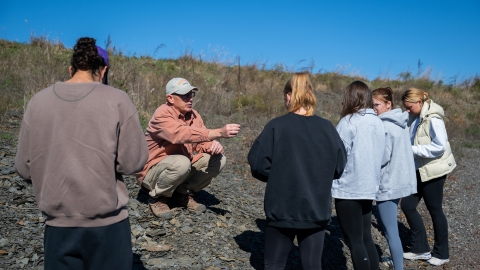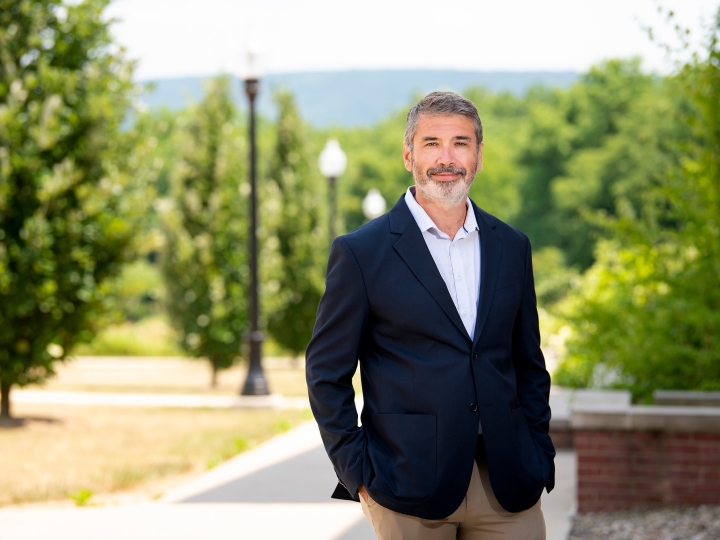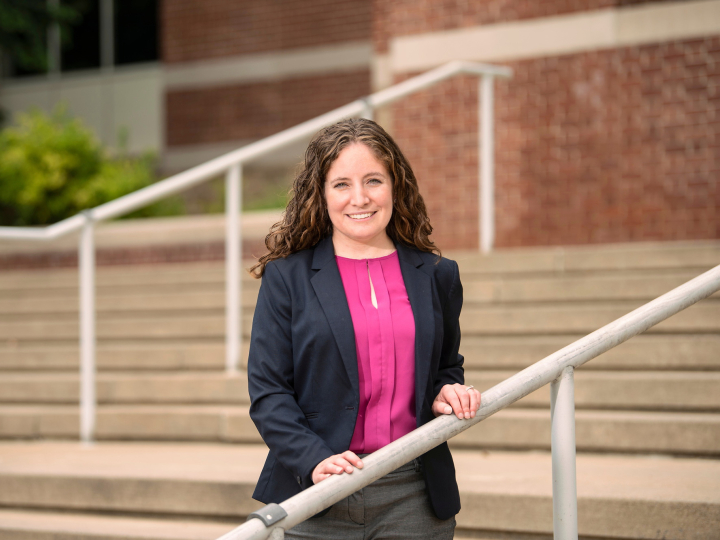
Bucknell Professor Awarded NSF Grant to Explore Ancient Climate and Early Vertebrate Evolution
October 10, 2025
Professor Jeffrey Trop speaks with geology & environmental geosciences students during a 2024 field trip. Photo by James T. Giffen, Marketing & Communications
Bucknell University Professor Jeffrey Trop, geology & environmental geosciences, is one of the recipients of a National Science Foundation (NSF) $148,000 collaborative grant supporting research that explores how environmental changes during the Late Devonian period — roughly 360 million years ago — influenced the evolution of early vertebrates in what is now the Appalachian Basin.
The project will analyze sedimentary, geochemical and fossil evidence preserved in ancient rocks across northern and central Pennsylvania, revealing how climate and habitat shifts shaped some of the earliest amphibian and reptile ancestors.
Researchers from Lycoming College, George Mason University and Rowan University are also contributing to the multi-institutional project. Together, the team aims to deepen scientific understanding of ancient environmental systems while inspiring public engagement with earth science and paleontology.
"Bucknell students and I will document features preserved in the local bedrock that allow us to reconstruct the nature of past habitats that hosted fossils that will be highlighted in displays at Reptiland," Trop says. "Our collaborators will be carrying out analyses on rock samples that will shed insight on the climate at the time."
Beyond its research goals, the NSF-funded project places strong emphasis on public outreach and education, particularly in rural communities with limited access to STEM (science, technology, engineering and mathematics) programming. The team — including 12 undergraduate students (four research, eight outreach) from Bucknell — will coordinate at least four educational field events annually, such as community fossil digs and collaborative learning programs with regional conservation organizations.
These events will invite participants to explore local geology firsthand, handle fossils and learn how paleontologists interpret ancient environments. NSF support will also help fund educational materials, travel for student participants, and the creation of new digital media to share discoveries through social media platforms.
"Outreach is an essential part of this work," Trop says. "These experiences allow students to connect scientific discovery with science communication, developing skills that apply across many fields while helping community members engage directly with the geologic history that surrounds them."
Bucknell will lead two hallmark events under the project's educational component — a National Fossil Day display on Wednesday, Oct. 15, and a Community Fossil Dig on Wednesday, April 15 — both aimed at promoting appreciation for paleontology and environmental science.
Since 2010, Bucknell's Department of Geology & Environmental Geosciences has celebrated National Fossil Day to encourage public awareness and stewardship of fossils. This year's event will be held Wednesday, Oct. 15, from 9 a.m. to 3 p.m. on the O'Leary Center lawn. It will feature interactive fossil displays from sites near campus, including marine corals, sea scorpions, and terrestrial plants and fish. Visitors can bring their own fossils for identification, answer fossil trivia for prizes, and learn about active paleontological research near Bucknell.
The department will again host its annual Community Fossil Dig at the Spring Township Fossil Pit on April 15, giving participants of all ages the opportunity to discover and study real fossils.
A signature outcome of the NSF project will be a new fossil display at Clyde Peeling's Reptiland, located near Bucknell in Allenwood, Pa. Reptiland — a nationally recognized zoo that welcomes more than 65,000 visitors annually — features reptiles and amphibians from around the world in immersive naturalistic habitats. The new exhibit will showcase Devonian fossils discovered in central and northern Pennsylvania and include interactive components that connect the region's ancient fossil record to the living reptiles and amphibians visitors see today.
"The goal is to introduce Reptiland visitors to the early evolution of amphibians and reptiles that eventually led to the modern organisms housed in the zoo — and how northcentral Pennsylvania is an especially important site for reconstructing this evolution," Trop says.
By combining groundbreaking research, undergraduate involvement and public engagement, Trop and his team are helping to bring Earth's deep past into sharper focus while inspiring curiosity about the processes that continue to shape our planet and its life.

